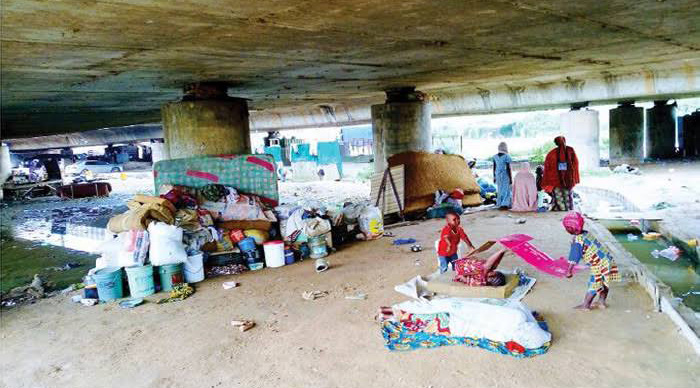1
ABUJA – Abuja, the Federal Capital Territory (FCT), was conceived as a model city, planned, orderly, and designed to reflect the promise of Nigeria’s future. Today, however, behind the gleaming government buildings and private mansions, a silent crisis grips the city – the dream of affordable housing is slipping away from millions of residents.
For many civil servants, journalists, traders, and artisans, the capital has become a paradox—homes stand vacant in choice districts, yet ordinary people are pushed into slums, satellite towns, and overcrowded settlements. The housing crisis in Abuja is not just about cement and concrete; it is a story of human struggle, failed policies, and survival.
Dream Deferred: Professionals Locked Out
Take the story of Umar, a mid-career journalist based in Abuja. After over a decade of reporting from the corridors of power, he admits he has no realistic plan to buy a home in the city.
“I do work hard, but I don’t see myself buying a house in Abuja… it will take the help of God,” Umar told this reporter.
His colleague, Solomon Odeniyi, echoes the same frustration. With a housing allowance of ₦41,000, he says the figure barely covers a month’s rent in the outskirts, let alone any meaningful mortgage contribution.
“Home ownership is a mirage. Even rents in satellite towns are rising beyond reach,” Solomon lamented.
These voices are not isolated. They represent a cross-section of professionals—teachers, health workers, civil servants—who are supposed to form Abuja’s middle class but find themselves priced out of the housing market.
Paradox of Empty Homes
Abuja has an estimated 1.7 million housing units, yet shockingly, over 45,000 homes stand empty in prime districts like Maitama, Asokoro, Guzape, Wuse II, Jabi, and even the vast Gwarimpa Estate.
These houses, many fully furnished and equipped with modern facilities, remain unoccupied, waiting for buyers who may never come. Developers often peg rents and sale prices in dollars, targeting expatriates, politicians, and high-net-worth individuals.
Ordinary residents, those who keep the city running, are forced into the fringes, swelling communities in Nyanya, Karu, Lugbe, Kubwa and Gwagwalada.
The irony is glaring. While Abuja grapples with a housing deficit, entire estates sit unoccupied, victims of speculation, corruption, and inflated costs.
Land: The Costly Foundation of the Crisis
At the heart of Abuja’s housing crisis lies the cost of land. According to Williams Olatunbosun, CEO of Casalavoro, land acquisition in the FCT accounts for up to half the price of a housing unit.
“If government reduced land costs by even 50 percent, housing prices would fall significantly,” he explained.
Olatunbosun, who has announced a bold plan to deliver 10 million affordable housing units in partnership with government, insists that without addressing land policies, affordable housing will remain elusive.
A Mother’s Story
For Chidinma, a 34-year-old single mother, the housing crisis is not an abstract policy debate, it is her daily battle.
She once rented a modest two-bedroom apartment in Sunnyvale Estate, but when her landlord increased the rent beyond her income, she was forced to relocate to Durumi III.
“I spend more time in traffic now, and rent still eats half my salary,” she said, holding her daughter close. “Sometimes I think of going back to the village, but I want my child to have opportunities here.”
Her story reflects the plight of thousands of families making tough choices, moving farther away from the city centre, sacrificing time, safety, and quality of life.
The Inflation Squeeze
The Housing Development Advocacy Network (HDAN) warns that inflation, rising construction costs, and currency devaluation have worsened the affordability crisis.
A one-bedroom flat in parts of Abuja now goes for ₦25 million to purchase, while annual rents for two-bedroom apartments in suburbs like Lugbe range between ₦1.5–₦2 million.
With minimum wage at ₦70,000, even saving every kobo would take decades for a worker to afford a modest home.
Slums in the Shadow of Skyscrapers
As the city sprawls, the poor are increasingly pushed into informal settlements— Dakwo, Mpape, Durumi, and Kuchingoro. These communities, often lacking clean water, sanitation, or proper roads, mushroom right next to luxury estates.
In Kuchingoro, residents live in makeshift structures of wood and iron sheets, paying as little as ₦3,000 monthly for shanties. But eviction threats loom, as city authorities periodically demolish these areas in the name of urban renewal.
For families here, the fear is constant: will they wake tomorrow to bulldozers flattening their only shelter?
Policy and Politics: Searching for Solutions
Lawmakers are beginning to respond. Earlier this year, a bill was introduced in the National Assembly limiting advance rent in Abuja to three months upfront, with subsequent monthly payments. If implemented, this could offer relief to tenants who currently face demands for one or two years’ rent in advance.
Housing advocates have also called for
subsidies on building materials; tax incentives for developers who deliver affordable units; Public–Private Partnerships (PPP) to pool resources and cooperative housing finance schemes that allow workers to pool funds.
Others are land provision for low-income earners, reducing one of the biggest barriers; but critics warn that without political will, these proposals will remain paper promises.
The Bigger Picture: A National Deficit
Nigeria faces a national housing deficit of over 28 million units, requiring an estimated ₦21 trillion to bridge. Abuja, as the political and administrative hub, mirrors this crisis in sharp relief.
Urban migration, high population growth, and weak mortgage systems continue to worsen the gap. Less than 10 percent of Nigerians can access mortgage financing, due to high interest rates—often above 20 percent—and stringent requirements.
Human Faces Behind the Numbers
Every statistic has a human face. Like Ibrahim, a tailor in Karu, who shares a single room with his wife and three children, paying ₦150,000 annually.
“I cannot save for a house. Everything I make goes to food, school fees, and rent,” he said.
Blessing, a civil servant who has lived in three different suburbs in six years due to constant rent hikes expressed her worries.
“We are like nomads in this city. The landlords control everything,” she sighed.
The Capital’s Unfinished Dream
Abuja was meant to be a city of hope, a unifying capital where Nigerians from all walks of life could thrive. Instead, it risks becoming a city of exclusion—where only the wealthy own lives, while the majority rent, squat, or drift into slums.
The housing crisis in Abuja is not just about economics; it is about dignity, stability, and the right to a decent life. Until government confronts the root causes—land policy, speculative pricing, weak financing—the capital will continue to mirror Nigeria’s inequality: skyscrapers for the few, shanties for the many.
For now, Abuja’s dream remains unfinished. And for residents like Umar, Solomon, Chidinma, and Ibrahim, home ownership is still that distant light at the end of a very long tunnel.








